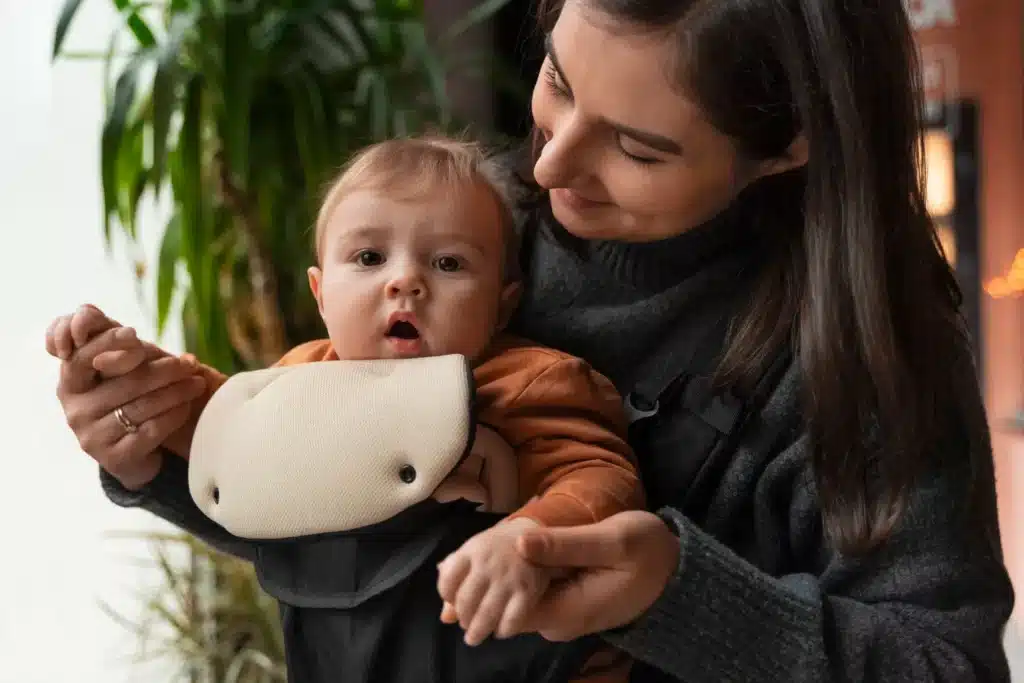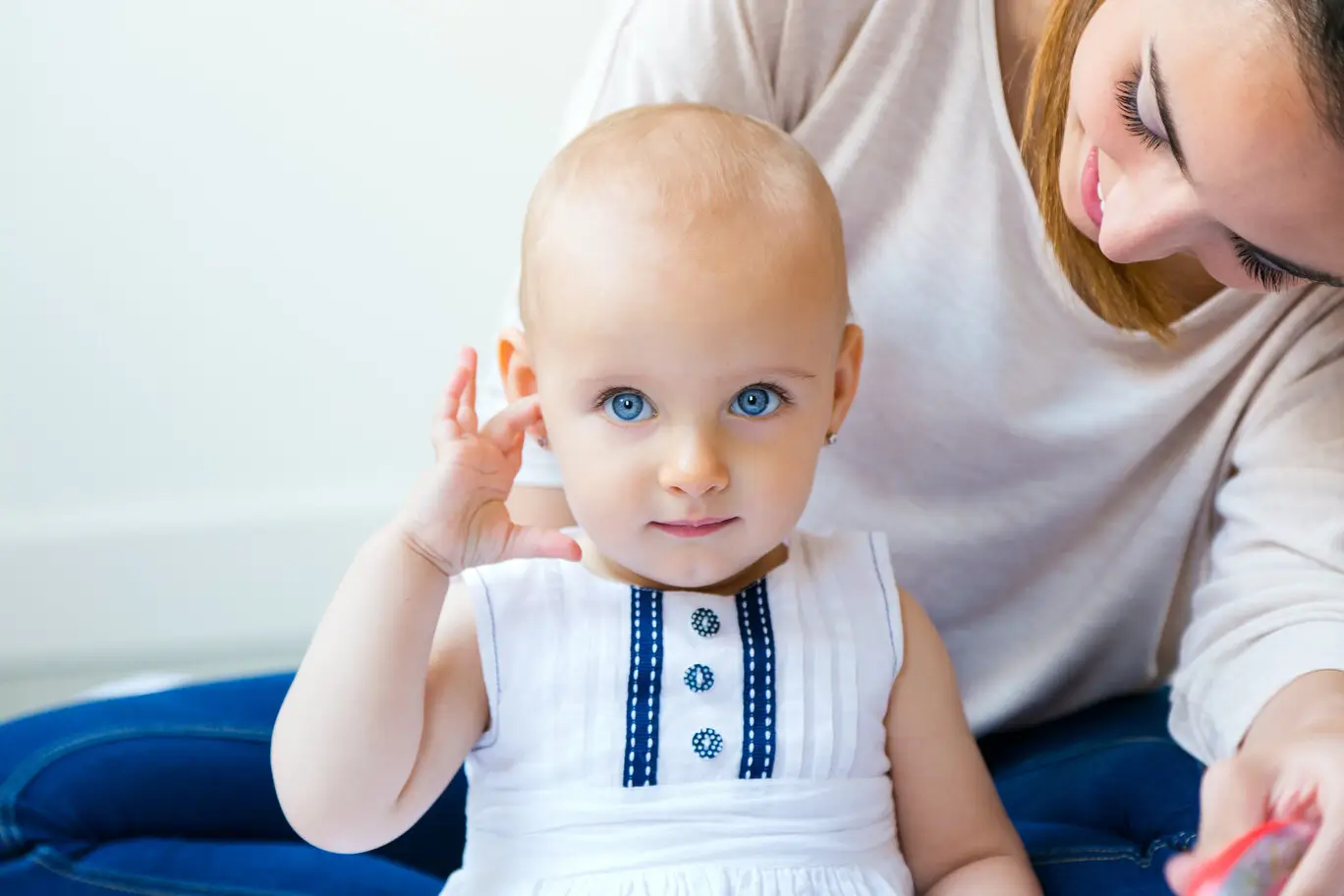Special needs newborn care begins the moment extra medical or developmental needs are noticed. Some babies need help with breathing, feeding, or temperature control. Others have conditions that affect growth, movement, or learning over time.
What “Special Needs Newborn” Means in Simple Terms
A special needs newborn is a baby who needs more medical or developmental support than the average healthy newborn in the first days, weeks, or months of life. This extra support might relate to breathing, feeding, growth, movement, or early brain development.
Hospitals and clinics may use different labels, such as “high-risk newborn”, “complex newborn”, or “medically fragile infant”, but the idea is similar. The baby needs extra monitoring, treatment, or follow-up care to stay as safe and healthy as possible.
Medical, Developmental, and Sensory Needs
A special needs newborn may have one or more of the following types of needs.
Medical needs: can include prematurity, lung problems, heart defects, infections, or metabolic conditions that affect how the body uses food and energy.
Developmental risks: may involve brain injury, lack of oxygen at birth, or genetic syndromes that affect learning, movement, or communication later in childhood.
Sensory and feeding challenges: can include difficulty latching, poor suck-swallow coordination, or strong sensitivity to sound, light, or touch. Some babies need tube feeds for a short period, while others continue with tube feeding for longer.
Not every baby with risk factors will have future disability, but careful monitoring makes it easier to catch early signs and respond quickly.
How a Special Needs Newborn Is Identified
A special needs newborn is usually identified through a mix of exams, tests, and ongoing observation.

Newborn care teams often:
- Perform full physical exams right after birth and in the first days of life
- Order screening tests such as blood tests, hearing checks, and some genetic screens
- Watch the baby closely in the nursery or NICU, especially if breathing, feeding, or muscle tone looks unusual
- Review pregnancy history, birth details, and family medical history
Sometimes the label appears only later, after repeated visits show developmental delays or other concerns that call for deeper assessment.
Types of Special Needs and Supports
A special needs newborn can have very different challenges from another baby with the same label. Every baby has a unique mix of strengths and needs, and support has to match that mix as closely as possible.
Medical and Surgical Needs
Some babies need strong medical support or surgery in the newborn period. Examples include:
- Heart surgery or heart medicines for serious heart defects
- Breathing support for lung disease, prematurity, or infections
- Treatment for metabolic disorders that affect blood sugar or body chemistry
These babies often spend time in the NICU or a special care nursery. Over time, care may shift from hospital-based treatment to regular checkups with specialty clinics.
Developmental and Therapy Needs
Other babies have a higher chance of developmental delay and need early therapy. This can include:
- Physical therapy to support movement, strength, and posture
- Occupational therapy to help with feeding, touch, and early play skills
- Speech and feeding therapy for early swallowing and communication
Support might start in the hospital and continue at home or in community programs. Many services are offered through early intervention systems or similar public programs.
Sensory, Emotional, and Family Support Needs
Some medically fragile newborn babies are very sensitive to sound, light, or touch. Others show strong stress signals or have difficulty calming. These babies benefit from:
- Gentle handling and skin-to-skin contact when medically safe
- Low light, reduced noise, and simple, steady routines
- Extra emotional support for parents and caregivers who may feel worried or worn down
Support for families can include counselling, peer groups, and education about conditions that link the newborn period with common disabilities in childhood.
Common Reasons a Special Needs Newborn Needs Extra Care
Many families hear that their baby needs a “higher level of care” and feel confused at first. The reasons for this can range from mild and short-term to serious and long-lasting.
Prematurity, Low Birth Weight, and Birth Complications
One major reason a special needs newborn needs extra care is prematurity. Babies born before 37 weeks often have lungs and digestive systems that are still learning their job and need close support.
Common reasons for extra care include:
- Preterm birth and immature lungs that need oxygen or other support
- Low birth weight, which raises risks for breathing and temperature problems special needs newborn.
- Birth complications, such as lack of oxygen, meconium aspiration, or emergency C-section
These babies may need help with breathing, feeding tubes, or careful temperature control in an incubator while they gain strength.
Congenital and Genetic Conditions
Another large group of common disabilities in childhood starts with conditions present at birth. These can include:
- Down syndrome and other chromosomal conditions
- Heart defects that require medicines, surgery, or long-term monitoring
- Metabolic disorders that affect how the body uses food and energy for special needs newborn.
Some of these conditions are diagnosed in pregnancy. Others appear after birth, when feeding, growth, or behavior at the crib side raises questions that lead to testing.
Maternal and Pregnancy Factors
Factors related to pregnancy also affect the chance that a baby becomes a special needs newborn. Research often points to:
- Maternal health conditions such as diabetes, high blood pressure, or infections
- Substance exposure during pregnancy, including alcohol and some drugs
- Poor access to prenatal care and needed medicines
- High stress, violence, or severe poverty during pregnancy
These factors do not guarantee disability, but they can increase risk and explain why careful follow-up is recommended for some babies even after a stable birth.
Potential Early Warning Signs of a Special Needs Newborn
Some signs appear right away in the delivery room or nursery. Others show up in the first weeks or months as a baby grows.
Physical Signs in the Newborn Period
Possible early warning signs can include:
- Breathing problems such as fast breathing, grunting, flaring nostrils, or frequent pauses
- Feeding difficulty such as weak suck, choking during feeds, very slow feeding, or poor weight gain
- Unusual muscle tone, with very floppy or very stiff arms and legs
- Seizures or strange movements, such as rhythmic jerking, eye deviation, or long spells of unresponsiveness
- Jaundice or color changes that require close monitoring
These signs do not always mean long-term disability, but they show that extra care is needed in the early days and that follow-up is wise.
Behavioral and Developmental Signs
Even in the newborn stage, behavior can give small clues that a baby needs more support.
Some early concerns include very limited eye contact or response to faces, very little movement, or constant irritability that is hard to calm. Lack of clear response to loud sounds or voices can also raise questions about hearing or brain function.
Over time, pediatricians and nurses compare these patterns with expected milestones and may suggest more focused checks.
Risk Factors and Screening Over Time
Families of babies with early warning signs are often offered a structured plan that might include:
- Scheduled follow-up visits with pediatricians and specialists
- Developmental screenings at set ages in infancy and early childhood
- Referrals to early intervention programs when needed
This plan makes it easier to track which babies catch up in development and which need longer-term support, including support for conditions classed as common disabilities in childhood.
How Common Disabilities in Childhood Relate to a Special Needs Newborn
Many common disabilities in childhood link back to risk factors or events in the newborn period. Not all will be visible at birth, but early health history gives important clues for later care.

Conditions That May Be Visible Early
Some conditions can be suspected or confirmed in the newborn period and the months that follow.
These include cerebral palsy risk in babies with prematurity, brain injury, or severe jaundice, as well as genetic syndromes such as Down syndrome or other chromosomal changes. Hearing and vision impairments are also sometimes flagged by newborn screening and early exams.
Babies with these conditions often join developmental follow-up programs to track progress over the first years of life.
Conditions That Often Become Clear Later
Other common disabilities in childhood are more likely to appear as a baby grows into a toddler or preschooler.
Autism spectrum disorder often becomes clearer between 18 and 36 months, especially when language, social interaction, or play skills differ from typical patterns. Attention-deficit/hyperactivity disorder (ADHD) is usually noticed in preschool or school years, when focus and impulse control demands rise. Specific learning disabilities are often identified when formal schooling starts and reading, writing, or math’s tasks highlight areas of struggle.
A history as a special needs newborn does not automatically mean these conditions will occur, but it may increase the need for regular checks and early support.
Why Early Monitoring Helps Development
Early monitoring and intervention can support many parts of development, including:
- Physical abilities such as turning over, sitting without support, crawling, and walking.
- Speech and language development, including understanding and using words
- Social and emotional skills, such as bonding, play, and early friendships
Early support can narrow gaps in development, reduce stress for the whole family, and improve long-term outcomes for children with common disabilities in childhood.
Hospital Care for a Special Needs Newborn: NICU and Special Care Nursery
Many babies with extra needs spend time in a neonatal intensive care unit (NICU) or a special care nursery. NICUs care for the sickest or most premature infants, while special care nurseries support babies who need help but are more stable.
To an outside visitor, these units can look like rooms full of monitors, wires, and machines. Each item has a clear purpose: keeping the baby safe, tracking vital signs, and supporting healing.
What Happens in the NICU or Special Care Nursery
In these units, a special needs newborn may receive different kinds of support, such as:
- Breathing support with oxygen, CPAP, or ventilators
- Feeding support through feeding tubes, IV nutrition, and lactation support
- Temperature control using incubators or radiant warmers
- Continuous monitoring of heart rate, breathing rate, and oxygen levels
Care teams in these units follow careful protocols to reduce complications and support growth while respecting the baby’s comfort as much as possible.
The Role of Parents and Caregivers in Hospital
Parents and caregivers are an important part of the team that cares for a special needs newborn.
Staff often encourage:
- Skin-to-skin contact, also called kangaroo care, when the baby is stable enough
- Participation in daily care, including diaper changes, gentle cleaning, and comforting touch
- Asking questions and practicing at-home skills such as feeding and medicine preparation before discharge
A tiny baby attached to multiple tubes may look intimidating, but nurses and doctors explain what each line does and how families can still bond and care for their child.
Planning for Discharge and Home Care
Before a special needs newborn leaves hospital, staff usually work through a detailed discharge plan.
This often includes:
- Reviewing feeding plans, medicines, and any special equipment
- Training parents and caregivers on equipment such as oxygen or feeding pumps
- Arranging follow-up visits with pediatricians, specialists, and therapists
- Connecting families with early intervention services and community support
Discharge is not the end of care. It is the start of a new chapter at home, with hospital teams still available for questions and follow-up.
Caring for a Special Needs Newborn at Home
Home is where daily routines form and where progress often becomes most visible. Life may include many appointments, but small patterns bring stability and help everyone feel more settled.

Feeding, Sleep, and Basic Care
For many families of a medically fragile newborn, daily life revolves around feeding, sleep, and basic care for special needs newborn.
Common tasks include:
- Following feeding schedules that might involve bottle, breast, tube feeds, or a combination
- Tracking growth with regular weigh-ins and growth charts
- Practicing safe sleep, with back sleeping on a firm mattress and no loose blankets
Some babies sleep in shorter bursts or need medication at set times. A simple written schedule on the fridge or a shared calendar can reduce confusion better than any fancy app.
Creating a Calm, Supportive Home Routine
Babies with sensory or developmental challenges often do well with a calm and predictable home routine.
Helpful steps can include:
- Setting regular times for feeding, sleep, and play
- Using soft lighting and quiet spaces, especially in the first weeks after hospital discharge
- Introducing visitors and new sounds slowly, so the baby has time to adjust
Even short, predictable quiet times during the day can help the nervous system settle, which may support sleep and feeding as well.
Mental Health for Parents and Caregivers
Caring for a special needs newborn can increase stress, grief, and exhaustion. Parents and caregivers may feel guilt, worry, or anger at different points, and these feelings can change from week to week.
Support can come from:
- Hospital social workers and psychologists who understand medical stress
- Community therapists familiar with disability, trauma, and long hospital stays for special needs newborn.
- Online and virtual care options focused on neurodivergence, disability, and family mental health, including resources from groups such as Charlie Health
Strong mental health support does not erase difficulty, but it can make daily life more stable and hopeful and can help families stay connected to each other.
From Special Needs Newborn to Toddler Defiance
If life with a baby with extra needs feels intense, life with a toddler from the same family can feel loud, messy, and very opinionated. Toddler defiance can appear in any family, but long medical histories may shape behavior and adult reactions in special ways.
Why Toddler Defiance May Be Stronger After a High-Needs Newborn Stage
After months of alarms, hospital visits, and medical focus, toddlers may:
- Seek attention in loud or stubborn ways
- React to changes in routine with meltdowns
- Copy stressed body language or tone from adults in the home
In families where a sibling is a special needs newborn or has ongoing needs, time and energy can be stretched thin, which may add extra tension to daily routines.
Gentle Behavior Strategies
Simple approaches can help with toddler defiance in homes touched by medical stress.
Helpful ideas include:
- Using clear, short rules such as “Feet stay on the floor”
- Keeping predictable routines for meals, sleep, and play
- Offering small choices, such as “blue cup or green cup”
- Praising positive behavior instead of focusing only on problems
Consistent structure supports both toddlers and adults, even during intense medical seasons, and can make home life feel safer for every child.
When to Ask for Extra Behavior Support
Extra help may be useful when:
- Intense toddler defiance appears alongside delayed speech or motor skills
- There are safety concerns such as running into roads or hitting and biting that do not improve
- Adults in the home feel at risk of burnout or feel unable to cope with daily behavior
In these cases, pediatricians can refer families to developmental pediatrics, child psychology, or family therapy services that understand disability and medical history.
Where to Get Support for a Special Needs Newborn
Support for a special needs newborn comes from several layers: hospital teams, public services, community groups, and mental health providers.
Hospital and Medical Team
Key contacts often include:
- Neonatologists and pediatricians
- NICU or special care nursery nurses
- Respiratory therapists, dietitians, and lactation consultants
- Social workers and case managers
These professionals help coordinate medical care, equipment, and follow-up appointments and can guide families toward helpful programs.
Early Intervention and Therapy Services
In many regions, early intervention programs provide free or low-cost services for babies and toddlers with delays or disabilities.
Services may include physical therapy, occupational therapy, speech and feeding therapy, and developmental education. These supports often take place at home or in community settings and can link closely with mental health care when needed.
Community, Peer, and Online Support
Support also comes from community groups and online spaces.
Helpful options include:
- Parent support groups and disability advocacy organizations
- Online communities focused on prematurity, genetic conditions, or medical complexity
- Mental health providers and organizations that write about neurodivergence, developmental disabilities, and mental health intersections, such as Charlie Health
Hearing from others on a similar path often reduces isolation and offers practical tips that standard guides never mention.
Conclusion
A special needs newborn brings extra challenges, but also extra chances to support growth from the very beginning. With clear information, early medical care, developmental follow-up, and strong mental health support, many babies make steady progress and many families find a new kind of stability.




